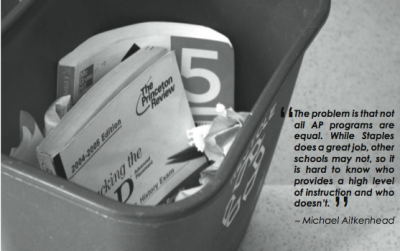
For the first two weeks in May, the gym and library will be filled with desks where Staples students will sit for three hours, furiously bubbling in answers and writing essays. They will do this in hopes of gaining college credit and the ability to waive introductory courses in college by receiving a passing score on Advanced Placement exams.
Despite her enrollment in AP World History and AP U.S. History, Morgan Singer ’11 has elected not to take either of her AP exams. This coming fall, Singer plans to attend the University of Maryland, where students must enroll in a core requirement of history classes at the university, regardless of any AP history classes they may have taken in high school.
“I wouldn’t be able to place out of any courses at school, so there was just no point in spending $90 per test to take,” Singer said.
An increasing number of colleges and universities are tightening their AP policies by not allowing students to waive out of introductory classes. Many will only approve credits for students who receive top scores of a 4 or 5 on AP exams, or not allow students to waive courses regardless of AP scores, as in Singer’s case.
According to AP Language and Composition teacher Julia McNamee, having an AP course that satisfies all colleges and universities would be difficult. McNamee has taught at both the University of Massachusetts and Fairfield University, where she cited significant differences in the ways the two schools teach English. “You couldn’t please everyone,” McNamee said. “It’s not possible to have a test that specifically does what every college does so that students would be prepared.”
McNamee, as well as AP Environmental teacher Michael Aitkenhead, have heard from many former Staples students that their college classes are easy after the preparation they received from Staples’ AP classes. However, this is not necessarily true for students from other high schools, and this gives colleges reason to not give students credit for AP classes.
“The problem is that not all AP programs are equal. While Staples does a great job, other schools many not, so it is hard to know who provides a high level of instruction and who doesn’t,” Aitkenhead said.
Aitkenhead also said Staples students should receive college credit more often for completing such rigorous AP courses. “In my opinion, the experience many of these students get in an AP class at Staples far exceeds the experience they would get in an introductory level course at most colleges or universities,” he said.
An alternative way for students to receive college credit is through the University of Connecticut’s Early College Experience program. Staples’ AP Spanish Language, AP French Language, and Italian 4A, are part of this program, which gives students college credit for any grade above a C. The grade will appear on a University of Connecticut transcript, which can be transferred to over 200 colleges.
“If students can enroll in the ECE program and earn college credit, they will take a demanding college level course and may be able to save a lot of money at the same time,” AP Spanish Language teacher Susan Pels said.
In order for these Staples courses to become ECE courses, course instructors and course syllabi were certified by the University of Connecticut to confirm that the high school courses correlate with the University’s course.
“Courses offered through UConn Early College Experience are the actual UConn college course, with a grade that is a reflection of the course as a whole, as opposed to a grade on one exam,” Marketing and Communications Manager in the Office of Early College Programs, Jennifer Griffin said.
Another advantage to the program, besides the possibility of receiving college credit, is that it only costs $25. This is a bargain compared to a $90 fee for AP tests, or even hundreds of dollars for a college course. For example, at Fairfield University, students pay $595 per credit.
Regardless of whether or not college credit is received for AP courses or ECE courses, these classes are preparing students and helping them succeed at the next level in college.
“Last year I had the opportunity to attend a UConn Spanish course at Storrs and came away satisfied that Staples students perform as well as, if not better than, the students in that course,” Pels said.













































